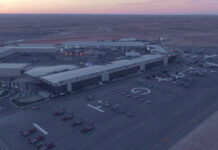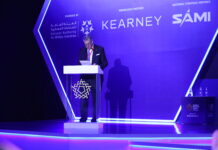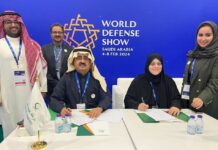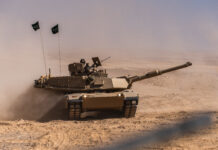The role of women in the defence industry is changing across the Middle East, but particularly in Saudi Arabia, as successful programmes such as the World Defense Show’s International Women in Defence forum have shown.
The defence sector remains a male dominated industry across the globe. It was reported last year that women represented just 23-25% of the workforce of the top five US defence contractors.
However, there is hope for change. When it comes to female CEOs, the aerospace and defence industry is surpassing other industries in equality. According to the Korn Ferry consultancy, women CEOs represent 19% of the leaders in aerospace and defence, compared to just 5% across all other sectors. Lockheed Martin, General Dynamics, Northrop Grumman and Boeing’s Defence, Space and Security division, four of the five largest US aerospace and defence firms, are all headed by women.
While the gender imbalance is also present in the Middle East, a traditionally more conservative region when it comes to gender roles, in recent years there has been a notable upturn in female participation and contribution. Arab women are increasingly breaking stereotypes by taking on roles traditionally reserved for men in the defence sector, with many now serving as pilots, engineers, peacekeepers, and in special forces units.
There have been notable achievements across the region recently: Jana Sader became Lebanon’s first female fixed-wing pilot; Sabaa Thnaibat was the first woman to fly the F-16 fighter solo in the Royal Jordanian Air Force; Sheikha Aisha bint Rashid Al Khalifa became Bahrain’s first female fighter pilot; Sara Sabry became the first Egyptian and first Arab woman in space; and Rayyanah Barnawi became the first Saudi female astronaut. All showcase a growing openness to challenge established gender norms.
This challenging of stereotypes and breaking of barriers is demonstrating a change in dynamics and priorities across the Middle East, but has been especially noticeable in Saudi Arabia.
The role of Saudi Vision 2030
The change to allow women into the Saudi military came as part of the Kingdom’s Vision 2030, which seeks to reform almost every aspect of life and government, including supporting women’s entry into the workforce. The expansion of women’s roles in the military and the integration of women into the armed forces are crucial steps toward achieving these goals. In 2018 the Kingdom opened up opportunities for women to apply for a number of non-military security roles. Saudi women have also been a part of public security since 2019, in the General Directorate of Prisons, Criminal Evidence and Customs and the General Directorate of Narcotics.
The Saudi military chief of staff, General Fayyad Al Ruwaili, and director-general of the General Administration of Admission and Recruitment, Major General Imad Al Aidan, launched the first military section for women in the Saudi Arabian armed forces in January 2021. This allowed women to join the military as lance corporals, corporals, sergeants, and staff sergeants in the Royal Saudi Land Forces, the Royal Saudi Air Defense force, the Royal Saudi Navy, the Royal Saudi Strategic Missile Force and the Armed Forces Medical Service. Women can also rise through the ranks to a number of officer positions and senior ranks.
The establishment of the Armed Forces Women’s Cadre Training Centre in February 2022 and the subsequent graduation of hundreds of women was another important step in in preparing women for military roles. The first female recruits graduated from the Armed Forces Women’s Cadre Training Centre in September last year, leading to women serving in frontline roles for the first time in the Kingdom’s history.
Continued regional progress
Further initiatives promoting gender equality and diversity have been implemented within defence institutions. Policies have been introduced to ensure equal opportunities for men and women in recruitment, training and career progression. Arab countries have also been investing in mentorship programmes and leadership development initiatives specifically tailored for women in the defence sector, fostering a supportive environment for their professional growth.
At the first World Defense Show in 2022 the International Women in Defence Program, which took place on 8 March – International Women’s Day – was a resounding success. Led by HRH Reema bint Bandar Al Saud, the Saudi Ambassador to the United States, the event addressed challenges and celebrated achievements in the industry through a series of expert panels and discussions. The programme returns for WDS 2024, with an expanded format and another impressive roll call of influential industry leaders, with Ambassador Reema once again at the helm.

“This is a moment to celebrate the contributions and achievements of women around the world from our past and present,” said Ambassador Reema of the event. “Women have been serving, fighting, and contributing to the security and prosperity of their nations for over 100 years.
“International Women in Defence is a global campaign, creating resilience in an ever-changing world, and helping us to navigate the challenges we face within the sector, sharing personal experiences and celebrating the contributions of women who continue to serve their country. In this event, we converge to support national, regional and international efforts to accelerate women’s participation in the defence sector on a global scale, forging alliances and sharing the best practices that are fundamental to retain the pace of change,” she added.
These acknowledgements of the advancements in the role of women in defence contribute greatly to changing global perceptions about the capabilities and contributions of women in traditionally male-dominated fields. In Saudi Arabia it signifies a broader societal shift in attitudes towards gender roles, reflecting a commitment to inclusivity, diversity, and the recognition of the valuable contributions women can make in defence and security.
The strides made in the Middle East thus contribute to the global narrative of women increasingly playing pivotal roles in the domain of defence and security.














